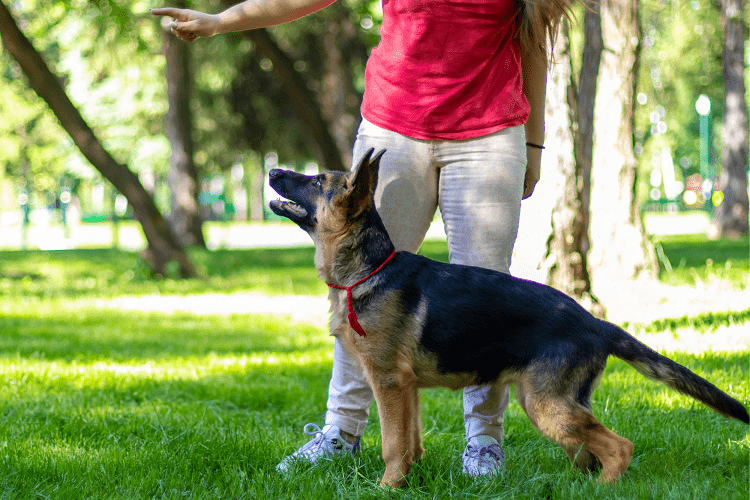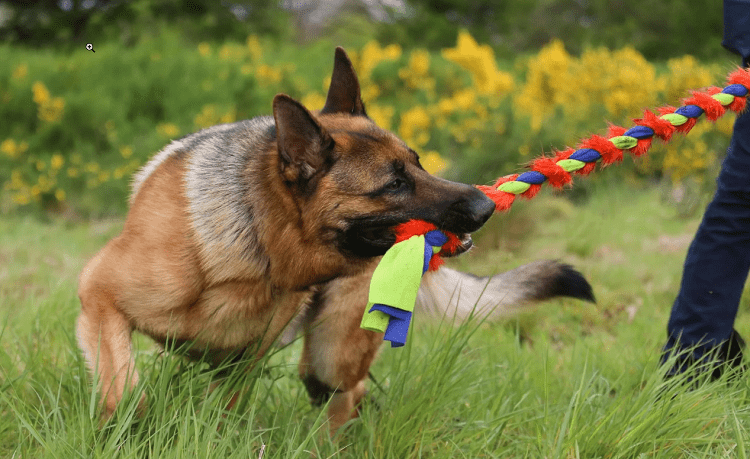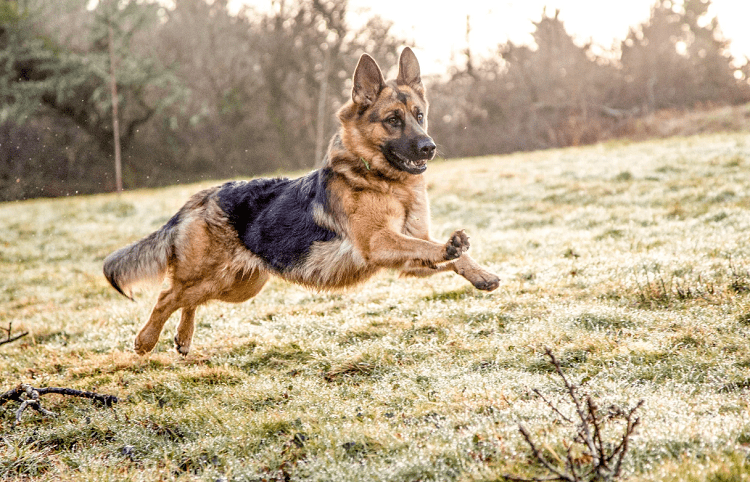How Much to Feed a 9 Month Old German Shepherd
By now, you've realized that caring for a German Shepherd puppy is no easy feat. Yet here you are, with hopes of continuing on your path to care for your not-so-little pup.
Pat yourself on the back! You've gotten them this far and healthy. But the journey is far from over, and new challenges await you, which should be coupled with new joys.
At nine months old, your German Shepherd is officially a juvenile. This age is like the teenage years for humans, where they're starting to grow and change physically and behaviorally.
They're close to becoming adults, but they're not quite there yet.
In this guide, we'll go over all these changes so that you can raise your German Shepherd through this new phase in its life.
Average Size and Height

A nine-month-old German Shepherd is mostly at 90% of its growth potential. They are a fairly large dog breed, with a male German Shepherd, at this age, typically weighing between 64 and 70.5 pounds.
Female German Shepherds tend to be slightly smaller, typically weighing between 55 and 59 pounds.
In terms of height, a male German Shepherd will range from 21-23 inches, while a female German shepherd would be around 19-21 inches.
If you're looking for a big dog that is still relatively easy to handle, a German Shepherd dog may be the breed for you.
Remember, they will continue to grow until they are about 12-15 months old, so make sure you have enough space for them to run around.
Nutrition for a Nine-Month German Shepherd

Between the ages of nine and 12 months, a German Shepherd will need three to 3 ½ cups of food spread over three meals daily.
It is usually about 1,600-2,000 calories, depending on the dog's weight requirement. This amount of food will help maintain their energy levels and keep their weight healthy.
It is important to remember that each dog is different and may need more or less food than this, so be sure to consult with your veterinarian if you have any concerns about your dog's diet.
Physical and Behavioral Changes

Your German Shepherd puppy will start to look like an adult dog. However, he may still exhibit some puppyish behaviors, such as goofiness, clumsiness, and stubbornness, when it comes to training.
It's essential to continue to encourage good behavior during this time.
Usually, a female German Shepherd puppy will also reach sexual maturity at around nine months old. They may have their first estrus (heat) period, so be mindful when other dogs are around during this time.
Around this time is when your puppy should be tested and treated for heartworm (speak with your vet for more detail), and slowly introduce solid adult food into their diet by mixing it with the puppy food.
Training Your 9-Month-Old German Shepherd

At the nine-month mark, house training should have started with your German Shepherd as more training and socialization exercise needs to be accomplished.
Obedience training should be next on your list. With more receptiveness to training, critical commands which are basic should be a priority to deal with because of their high-energy nature.
Commands, like sit and stay, should be at the top of your list regarding dog training.
How to Teach the Sit Command
The sit command is one of the simplest commands to teach your dog. You can start by holding a treat before your German Shepherd's nose and saying, "sit."
As they begin to sniff at the treat, slowly bring it up over their head so that their bottom hits the ground. Once they are sitting, say "good dog" and give them the treat.
How to Teach the Down Command
Your German Shepherd will learn to be down on command with enough practice! The down command can be a little trickier to teach, but it is still possible with patience and practice.
Start by having your puppy in a sitting position. Then, hold a treat close to their nose and say "down."
Slowly lower the treat to the ground, moving it back and forth until your dog's front legs are stretched out in front of them, and their bottom touches the ground.
Once they are down, say "good dog" and give them the treat.
How to Teach the Stay Command
The stay command is an excellent command in your German Shepherd's repertoire, as it can be used in various situations. To teach this command, start by having your German Shepherd sit or stand.
Then, say "stay" while taking a step backward. If they stay put, say "good dog" and give them a treat. However, if your dog did not follow the command, say "no" and try again.
How to Teach the Come Command
The come command is important to know, as it can help you recall your dog if they ever get loose. To teach this command, start by calling your German Shepherd's name and saying, "come."
As they come towards you, say "good dog" and give them a treat. If they do not come when called, say "no" and try again.
Toys For Your 9-Month German Shepherd Puppy

German Shepherds require a lot of energy-burning, mentally-stimulating activities to avoid unwanted behavior.
It's important to keep them busy with toys, and feel fulfilled at the end of each day. Here are some types of toys that can keep your pup active.
- Chew Toys: Chew toys are great for German Shepherds of all ages and are especially important for teething puppies. Be sure to choose a toy that is made of durable materials, as German Shepherds can be tough on their toys.
- Interactive Toys: Interactive toys are a great way to keep your German Shepherd's mind occupied. They often require the dog to figure out how to get the treat or toy that's inside.
- Puzzle Toys: Puzzle toys are another great option for interactive play. They often require the dog to use its nose or paw to manipulate the toy to get the treat inside.
- Ball Toys: Ball toys are great for German Shepherds who love to fetch. Be sure to have plenty of space outside!
- Rope Toys: Rope toys are great for German Shepherds who love to play tug-of-war. Be sure to choose a toy that can withstand this high-energy dog.
9-Month-Old German Shepherd – Health Issues

As your German Shepherd enters their ninth month of life, it will continue to grow and develop.
However, keeping an eye on their health during this time is vital. Here are a few things to look out for:
- Weight Gain – As your German Shepherd continues to grow, it may start to gain weight. Monitor their food intake and activity level to ensure they are not gaining too much weight.
- Lethargy – If your German Shepherd starts to become lethargic or sluggish, it could be a sign of illness. Be sure to take them to the vet if you notice any changes in their energy level.
- Vomiting – Be sure to take them to the vet if you notice any changes in their vomiting or eating habits.
- Diarrhea – If you notice any changes in their stool or frequency of bowel movements, be sure to take them to the vet.
It's essential to watch out for any possible health issues as these may be telling signs of more significant issues such as the following common problems of the German Shepherd breed:
Hip Dysplasia
Hip Dysplasia is a typical issue in German Shepherds. It is a condition in which the hip joint does not develop correctly, which can lead to pain and arthritis.
Elbow Dysplasia
Elbow dysplasia is a condition that can affect German Shepherds and other breeds of dogs. It is caused when the elbow joint does not develop properly, leading to pain and inflammation.
Dogs with elbow dysplasia may be unable to use their arms properly and may have difficulty walking.
Bloat
Bloat, also known as gastric torsion or stomach twist, is a condition that can affect German Shepherds and other breeds of dogs. Gas builds up in the stomach and twists on itself, resulting in gastric torsion.
It can cut off the blood supply to the stomach and cause death. Dogs with bloat may vomit, have a distended abdomen, and be restless or distressed.
Epilepsy
Epilepsy is a neurological disease that may cause seizures. Seizures can be caused by many things, including low blood sugar, low oxygen levels, or high-stress levels.
German Shepherds are prone to this condition, which can be deadly if not treated. Dogs who have epilepsy may be prescribed medication to help control their seizures.
Degenerative Myelopathy
Degenerative myelopathy is a neurological illness that affects the spinal cord. It is a slowly progressive disease that can eventually cause paralysis.
German Shepherds are prone to this condition, and there is no cure. Treatment focuses on managing the symptoms and preventing further decline.
If you notice any health problems in your German Shepherd, be sure to take care of them at the vet immediately. Early detection and treatment are vital in keeping your dog healthy and happy.
Exercise Needs for 9-Month-Old German Shepherds

German Shepherds are high-energy dogs that require plenty of exercise to stay healthy and happy.
While every dog is different, most German Shepherds need at least 45 minutes of exercise per day, divided into two sessions.
It can include a vigorous walk or run, playing fetch or Frisbee, or even going for a swim.
If your German Shepherd isn't getting enough exercise, it may become anxious or destructive and develop health problems such as obesity.
Be sure that you're prepared to provide them with plenty of opportunities to burn off energy.
Also read:
- Everything to Know About Caring for a 10-Month-Old German Shepherd
- How to Take Care of an 8-Month German Shepherd
- 7-Month-Old German Shepherd
Conclusion
At nine months old, your German Shepherd is considered a juvenile. They are growing rapidly, and their energy levels are at an all-time high.
Giving them plenty of exercise and mental stimulation is crucial to avoid unwanted behavior. Toys and interactive games are a great way to incorporate both into their active time.
With proper care and training, your German Shepherd will continue to grow into a happy and healthy adult.
Resources:
- UFAW.org.uk
- PetHelpful.com
- AlpineVet.ca
- VetsNow.com
- OrthoDog.com
Source: https://www.anythinggermanshepherd.com/9-month-old-german-shepherd/
0 Response to "How Much to Feed a 9 Month Old German Shepherd"
Postar um comentário